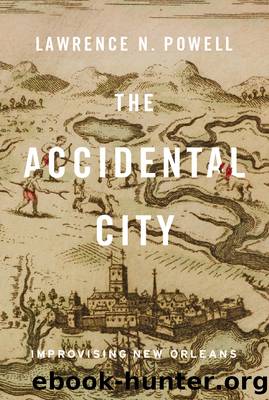Accidental City : Improvising New Orleans (9780674068933) by Powell Lawrence N

Author:Powell, Lawrence N. [Powell, Lawrence N.]
Language: eng
Format: epub
Publisher: Harvard Univ Pr
Published: 2012-10-15T00:00:00+00:00
8
SLAVERY AND THE STRUGGLE FOR MASTERY
ONE THING WAS CERTAIN about slavery in colonial New Orleans: it was never static. It had a historyâwhich is to say, it changed over time. The change was uneven, though. It was shaped by the environment, as well as by political and demographic factors. There was the swampy ecology through which New Orleans slavery twined like wisteria through a trellis. There were the never-ending backdrafts of international conflict unleashed by an imperial foot-race to control a continent. And there was the multicultural arena in which slavery along this stretch of the Lower Mississippi first played out. For almost overnight, the New Orleans region had become a site of sharp collisions and odd collusions among peoples from four hemispheres, and this, too, had a huge impact on slaveryâs evolution in this always-challenging latitude.
Then there was regime change. First, came the minions of Louis XV and the banker John Law, whose overreach in the Natchez region incited a rouge et noir uprising that nearly cost France a colony. From the slaveownerâs point of view, history careened backward after this revolt. As a result, the colonyâs agro-export sector went wobbly, and so did the master-slave relationship. Slaves acquired a sense of petty proprietorship from the provision grounds that cost-cutting owners made available for their self-support. They developed a sense of independence from the niche market they created for their fish, fowl, garden surpluses, and basketware, and from the skills and services they rented out in and around New Orleans, where the colonyâs now slow-growing population huddled for security. And in the process, they refashionedâfrom the fragments of cultural inheritance and collective memory, and from environmental artifacts lying close at handâthe rudiments of a dynamic Creole identity. It was an extraordinary turn of events, maybe the only instance of a major slave society reversing course and taking on the characteristics of a protean frontier that happened to include slaves.1
But then the history of Louisiana slavery, particularly the variant that took root in the New Orleans region, shifted course again with the regime change of 1769. For Madridâs determination to integrate its newly acquired French colony into its economic empire involved more than tweaking trade policy or shoring up tobacco prices. A loose-jointed society had to be guided back toward its destiny as a full-blown slave society, which required reviving plantation agriculture and reopening the slave trade. The transformation would not happen by fiat, and certainly not on the command of higher authority. The transition was messy, with a lot of give-and-take. One might say it was negotiated, even contested. The framework of law, custom, and religious tradition installed by Spanish bureaucrats to regulate Louisiana bondage pretty much guaranteed that would happen. Those understandings would form the rules in an unequal boundary dispute between masters and slaves over the scope of relative freedom. And depending on who was doing the enforcingâor on the state of foreign and domestic politics at the timeâthose rules would constrain the power of the former, while widening the agency of the latter.
Download
This site does not store any files on its server. We only index and link to content provided by other sites. Please contact the content providers to delete copyright contents if any and email us, we'll remove relevant links or contents immediately.
| Americas | African Americans |
| Civil War | Colonial Period |
| Immigrants | Revolution & Founding |
| State & Local |
In Cold Blood by Truman Capote(3378)
The Innovators: How a Group of Hackers, Geniuses, and Geeks Created the Digital Revolution by Walter Isaacson(3166)
Steve Jobs by Walter Isaacson(2890)
All the President's Men by Carl Bernstein & Bob Woodward(2370)
Lonely Planet New York City by Lonely Planet(2218)
And the Band Played On by Randy Shilts(2199)
The Room Where It Happened by John Bolton;(2152)
The Poisoner's Handbook by Deborah Blum(2135)
The Innovators by Walter Isaacson(2098)
The Murder of Marilyn Monroe by Jay Margolis(2095)
Lincoln by David Herbert Donald(1983)
Being George Washington by Beck Glenn(1927)
A Colony in a Nation by Chris Hayes(1927)
Under the Banner of Heaven: A Story of Violent Faith by Jon Krakauer(1797)
Amelia Earhart by Doris L. Rich(1691)
The Unsettlers by Mark Sundeen(1682)
Dirt by Bill Buford(1671)
Birdmen by Lawrence Goldstone(1662)
Zeitoun by Dave Eggers(1644)
